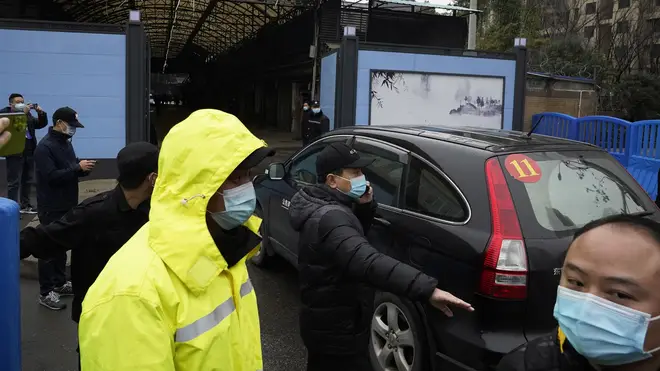
Nick Ferrari 7am - 10am
31 January 2021, 08:35

A World Health Organisation (WHO) team looking into the origins of the coronavirus pandemic have visited a market known to be the food distribution centre for the Chinese city of Wuhan during its lockdown.
The team members were seen walking through sections of the Baishazhou market - one of the largest wet markets in Wuhan - surrounded by a large entourage of Chinese officials and representatives.
The members, with expertise in veterinarian, virology, food safety and epidemiology, have so far visited two hospitals at the centre of the early outbreak: Wuhan Jinyintan Hospital and the Hubei Integrated Chinese and Western Medicine Hospital.
On Saturday, they also visited a museum exhibition dedicated to the early history of Covid-19.
The WHO said on Twitter the team planned to visit hospitals and markets like the Huanan Seafood Market, which was linked to many of the first cases.
They also listed the Wuhan Institute of Virology and laboratories at facilities including the Wuhan Centre for Disease Control as places they intended to visit.

WHO scientists arrive in Wuhan to start pandemic investigation
The mission has become politically charged, as China seeks to avoid blame for alleged missteps in its early response to the outbreak.
A single visit by scientists is unlikely to confirm the origins of the virus.
Pinning down an outbreak's animal reservoir is typically an exhaustive endeavour that takes years of research including taking animal samples, genetic analysis and epidemiological studies.
One possibility is that a wildlife poacher might have passed the virus to traders who carried it to Wuhan.
The Chinese government has promoted theories, with little evidence, that the outbreak might have started with imports of frozen seafood tainted with the virus, a notion roundly rejected by international scientists and agencies.
A possible focus for investigators is the Wuhan Institute of Virology, which built an archive of genetic information about bat coronaviruses after the 2003 outbreak of SARS, or severe acute respiratory syndrome.

WHO adviser expresses concerns over WHO investigations in Wuhan
Last week, the team were released from quarantine in China to investigate the origins of the virus. The researchers left their hotel after 14 days inside and boarded a bus in Wuhan.
Former WHO official Keiji Fukuda, who is not part of the team in Wuhan, cautioned earlier this month against expecting any breakthroughs any time soon.
He claims it may take years before any firm conclusions can be made on the virus's origin.
"This is now well over a year past when it all started," he said. "So much of the physical evidence is going to be gone.
"The memories of people are imprecise and probably the physical layout of many places are going to be different than they were and how people are moving about and so on."
The mission only came about after considerable wrangling between the sides that led to a rare complaint from the WHO that Beijing was taking too long to make final arrangements.
China, which has strongly opposed an independent investigation it could not control, said the matter was complicated and that Chinese medical staff were preoccupied with new virus clusters in Beijing, Shanghai and other cities.
While the WHO was criticised early on, especially by the US administration, for not being critical enough of the Chinese response, it recently accused China and other countries of moving too slowly at the start of the outbreak.